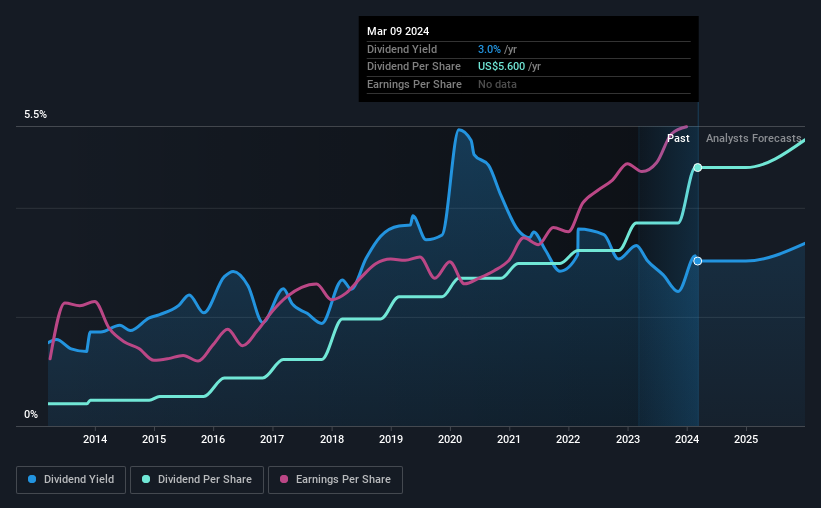Federal Agricultural Mortgage (NYSE:AGM) Could Be A Buy For Its Upcoming Dividend

Federal Agricultural Mortgage Corporation (NYSE:AGM) stock is about to trade ex-dividend in four days. Typically, the ex-dividend date is one business day before the record date which is the date on which a company determines the shareholders eligible to receive a dividend. The ex-dividend date is an important date to be aware of as any purchase of the stock made on or after this date might mean a late settlement that doesn’t show on the record date. Thus, you can purchase Federal Agricultural Mortgage’s shares before the 14th of March in order to receive the dividend, which the company will pay on the 28th of March.
The company’s next dividend payment will be US$1.40 per share, and in the last 12 months, the company paid a total of US$4.40 per share. Based on the last year’s worth of payments, Federal Agricultural Mortgage stock has a trailing yield of around 3.0% on the current share price of US$185.16. We love seeing companies pay a dividend, but it’s also important to be sure that laying the golden eggs isn’t going to kill our golden goose! So we need to check whether the dividend payments are covered, and if earnings are growing.
Check out our latest analysis for Federal Agricultural Mortgage
Dividends are typically paid from company earnings. If a company pays more in dividends than it earned in profit, then the dividend could be unsustainable. Fortunately Federal Agricultural Mortgage’s payout ratio is modest, at just 28% of profit.
Companies that pay out less in dividends than they earn in profits generally have more sustainable dividends. The lower the payout ratio, the more wiggle room the business has before it could be forced to cut the dividend.
Click here to see the company’s payout ratio, plus analyst estimates of its future dividends.
Have Earnings And Dividends Been Growing?
Businesses with strong growth prospects usually make the best dividend payers, because it’s easier to grow dividends when earnings per share are improving. Investors love dividends, so if earnings fall and the dividend is reduced, expect a stock to be sold off heavily at the same time. Fortunately for readers, Federal Agricultural Mortgage’s earnings per share have been growing at 12% a year for the past five years.
Another key way to measure a company’s dividend prospects is by measuring its historical rate of dividend growth. In the past 10 years, Federal Agricultural Mortgage has increased its dividend at approximately 28% a year on average. It’s exciting to see that both earnings and dividends per share have grown rapidly over the past few years.
Final Takeaway
From a dividend perspective, should investors buy or avoid Federal Agricultural Mortgage? Companies like Federal Agricultural Mortgage that are growing rapidly and paying out a low fraction of earnings, are usually reinvesting heavily in their business. Perhaps even more importantly – this can sometimes signal management is focused on the long term future of the business. We think this is a pretty attractive combination, and would be interested in investigating Federal Agricultural Mortgage more closely.
With that in mind, a critical part of thorough stock research is being aware of any risks that stock currently faces. In terms of investment risks, we’ve identified 1 warning sign with Federal Agricultural Mortgage and understanding them should be part of your investment process.
A common investing mistake is buying the first interesting stock you see. Here you can find a full list of high-yield dividend stocks.
Have feedback on this article? Concerned about the content? Get in touch with us directly. Alternatively, email editorial-team (at) simplywallst.com.
This article by Simply Wall St is general in nature. We provide commentary based on historical data and analyst forecasts only using an unbiased methodology and our articles are not intended to be financial advice. It does not constitute a recommendation to buy or sell any stock, and does not take account of your objectives, or your financial situation. We aim to bring you long-term focused analysis driven by fundamental data. Note that our analysis may not factor in the latest price-sensitive company announcements or qualitative material. Simply Wall St has no position in any stocks mentioned.
Source link





